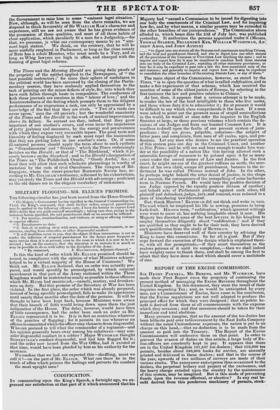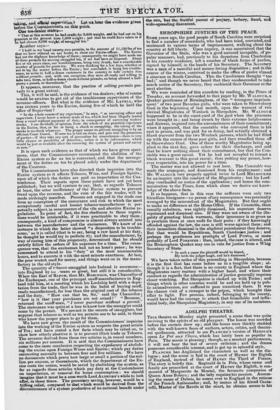REPORT OF THE EXCISE COMMISSION.
SIR HENRY PARNELL, Mr. BERENS, and Mr. Wicturikm, have made their First Report upLai the propriety of continuing the present method of managing the Excise Revenue throughout the United Kingdom. In this document, they state the result of their inquiries respecting Tea ; and, as would be anticipated by every man, not a Commissioner of Excise, have come to the conclusion, that the Excise regulations are not well adapted to produce the principal effect for which they were designed ; that no public be- nefit is derived from them at all commensurate with the expense which they occasion ; and that measures should be taken for their immediate and total abolition.
Many persons imagine, that as the amount of the tea-duties has been hitherto paid over to Government by the East India Company without the usual Customhouse expenses, the nation is put to no charge on this head,—that no deduction is to be made from the amount so paid into the Treasury. The Report of the Excise Commissioners will undeceive them on that point. In order to prevent the evasion of duties on this article, a large body of Ex- cise-officers are constantly kept in pay. It appears that there are in the United Kingdom 101,687 tea-dealers ; that 850,000 tea permits, besides about 300,000 books for entries, are annually printed and delivered to these dealers; and that in the course of the year, upwards of two millions of surveys are made of their various stocks. The annoyance and expense thus occasioned to the dealers, the perpetual bribery and perjury of the excisemen, and the heavy charge entailed upon the country by the maintenance of this system, may be imagined. But is this mode of preventing frauds upon the revenue effectual, or abortive? Is any real be- nefit derived from this ponderous machinery of permits, stock- taking, and offigial supervis.°.on? Let ua hear the evidence given before the Commissioners on this poirdr. One tea-dealer statn4— " That at this moment he had' credit for 3,000 weight, mad he had not on his premises at the present time 1,000 weight ; and that he could have taken in if Ile had chosen 2,000 weight of smuggled tea."
Another says-
" I hold in my hand twenty-two permits, to the amount of 11,138 lba of tea that we have entered on our books, to show our Excise-officer. The Excise had not the slightest knowledge of them; consequently we might have made use of those permits for moving smuggled tea, if we had been so disposed. About five or six years since, our warehouseman, being very drunk, lost a considerable number of permits for green tea. We were thinking for a few days, whether or not to lay the matter before the Excise ; but concluded, it being less trouble-. some, to write to half-a-dozen customers in the country to take certain teas without permits; and, with one exception, they were all ready and willing to take two, three, or half-a-dozen chests without permits, on being allowed a half- penny a pound, or thereabouts." It appears, moreover, that the practice of selling permits pre- vails to a great extent.
This, it will be said, is the evidence of tea-dealers; who of course would be anxious to get rid of the troublesome supervision of the revenue-officers. But what is the evidence of Mr. LAYELL, who was sixteen years in the Excise, during five of which he held the office of Supervisor?
" In the whole course of my experience," he says, " as surveying officer and supervisor, I never knew a seizure made of tea, which had been illegally landed from a vessel without payment of duty, in consequence of surveying traders' stocks. I am decidedly of opinion, from the whole of my practical experience in the Excise, that, as far as being a check to smuggling, the taking of the stocks is no check whatever. The proper means to prevent smuggling is by an efficient Coast Guard. If once tea is laid on shore, and gets into the possession of parties—if they take any sort of precaution for concealment—there is very little chance or possibility of detection ; unless it is by information, which would be just as available after the removing the system of permit and survey as now."
It is upon such evidence as that of which we have given speci- mens, that the Commissioners recommend the abolition of the Excise system as far as tea is concerned, and that the manage- ment of the duties on tea be placed solely under the department of the Customs.
The Commissioners have also directed their inquiries into the Excise system as it affects Tobacco, Wine, and Foreign Spirits ; upon all of which the duties are paid on importation at the Cus- tomhouse. Their reports upon these points have not yet been published; but we will venture to say, that, as regards Tobacco at least, the utter inefficiency of the Excise system to prevent fraud upon the revenue, and the ruin of the fair trader, will be made strikingly manifest. Persons not engaged in the trade can form no conception of the annoyance and risk to which the most scrupulously careful and honest tobacco-manufacturer is per- petually subject, in consequence of the vile and abortive Excise re- gulations. Iu point of fact, the due obedience to those regula- tions would be intolerable, if it were practicable to obey them ; consequently, a kind of compromise is almost always entered into between the manufacturer and the exciseman. We know of an instance in which the latter showed "a disposition to be trouble- some," as it is called (that is to say, being a raw hand at his duty, he thought he would try to perform it); and the manufacturer, by way of curing him of this propensity, determined that he should strictly follow the orders of his superiors for a time. The conse- quence was, that the exciseman had not an hour's peace ; he was summoned to attend to his "duty" at the most unseasonable hours, and to execute it with the most minute exactness. At last, the poor wretch sued for mercy, and things went on in the manu- factory in the old style. The quantity of t"bacco smuggled into Ireland is enormous— into England by no _aeons so great, but still it is considerable. When the Earl of RIPON, then Mr. RoeiNsoN, was Chancellor of the Exchequer, one of' the principal snuff-manufacturers in Eng- land told him, at a meeting which his Lordship held with a depu- tation from the trade, that he was in the habit of buying snuff, ready-manufactured, for less than the original cost of the tobacco and the duty. " How can that be, Sir,' said the Chancellor " how is it that your purchases are not seized ?" " Because," returned the snuff-man, "I never purchase without a permit." The statesman was quite at a loss to know how the smuggler could come by the permit. We are not in the secrets of smugglers, but suppose that tobacco as well as tea permits are to be sold, to those who know the proper place to go for them.
We have now given the result of the Commissioners' inquiries into the working of the Excise system as respects the great article of Tea; and have stated a few facts which may be relied on, to show how utterly abortive it is to prevent illicit trade in Tobacco. The revenue derived from these two articles is, in round numbers, six millions per annum. It is said that the Commissioners have come to the same conclusion respecting the expediency of abolish- ing the excise upon Foreign Wines and Spirits ; which pay duties amounting annually to between four and five millions. We have no documents which prove how large or small a portion of the mil- lion per annum, or thereabouts, which the department of the Ex- cise costs the nation, would be saved by abolishing the system, as far as regards those articles which pay duty at the Customhouse on importation, or removal for home consumption : we should imagine that it must be a sum worth Lord ALTHORP'S while to look after, in these times. The pecuniary saving, however, would be a trifling relief, compared to that which would be derived from the &continuance of a system productive of no national benefit under
...110011141■41m.••■•••••■•■••
the sun, but the fruitful parent of perjury, bribery, fraud, and
`11.111•00 wide-spreading discontent.

















 Previous page
Previous page